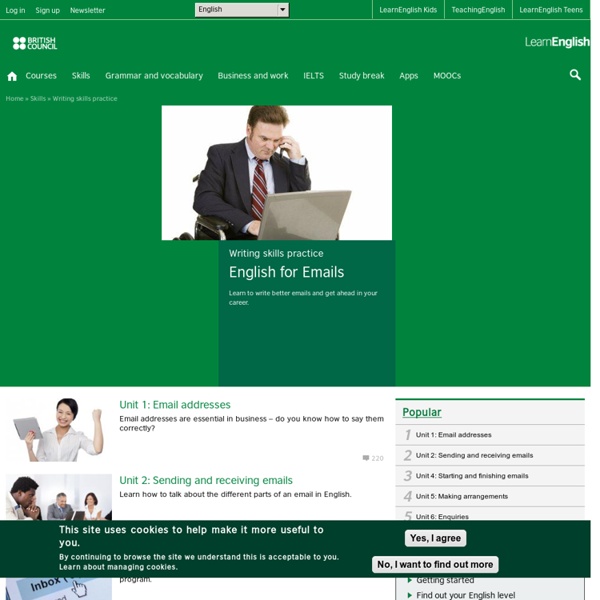



http://learnenglish.britishcouncil.org/en/english-emails
Related: writing • Business & ESPThe lost art of letter writing Over recent years, letter writing has been replaced by other ways of communicating. Technology has developed so rapidly that we now expect to be able to talk to people instantly - and get a response from them almost straight away. Rather than putting pen to paper, for most of us it now feels much more natural to send texts and emails, quickly typing out our message within seconds. Of course, there are advantages to these modern ways of communicating. We live in a fast-paced world and it’s important we keep up. We can chat to people all over the globe, within seconds! ESL- Role Play to Practice Giving Personal Information Use this role play to practice asking about personal information. Make sure you know how to ask questions with the verb "to be". Personal information includes information about a person's job, marital status, address, phone number, etc. these questions are important when providing information at banks, schools, stores, when taking surveys and more. Personal Information What's your surname (family name)? Smith
How to End an Email You’ve worked to make your email clear, and you’ve carefully edited to streamline your writing. The body of your email might well be perfect, but it can all go awry if you use the wrong sign-off. It’s just a word or a short phrase, followed by your signature, and yet finding the right tone to close your email often requires a surprising amount of thought and finesse. When you’re struggling with how to end an email, it’s best to consider the context. What works for a friend or close colleague won’t work in a strictly professional correspondence with a distant acquaintance or someone you’ve never met before. Here’s a rundown of some of the most common email settings and the tried-and-true sign-offs that work best for each.
70 useful sentences for academic writing Back in the late 90s, in the process of reading for my MA dissertation, I put together a collection of hundreds of sentence frames that I felt could help me with my academic writing later on. And they did. Immensely. After the course was over, I stacked my sentences away, but kept wondering if I could ever put them to good use and perhaps help other MA / PhD students. The Ultimate Guide to Customer Service Training Use these tips to turn new hires and seasoned pros alike into masters of support. What’s the difference between a support team that simply does support, and one that’s really good at it? If you follow this blog, you probably already know the answer. Investing in delivering excellent customer service is one of the most valuable things you can do to grow your business. Numerous studies have shown that happy customers buy more, they buy more often, and they tell their friends to buy, too. In fact, a happy customer, on average, tells nine people about their experience.
Write and Improve: An Online writing helper Writing is probably the most difficult area for learners to improve on by themselves. Writing demands an audience and if you have no-one to tell you how successful your efforts are – or not – then you are doomed to repeat your failures into eternity. Cambridge English have, however, just released a beta version of an online, browser based writing helper. Business English idiom cliches and alternative vocabulary When you are working, do all of your colleagues and clients clearly understand your business English, or are you speaking in corporate buzzwords that cloud your meaning? New business vocabulary and hot phrases are a big temptation to use, as they can make you feel clever and 'in with the in crowd', but these chunks of English can very quickly become cliches and should be avoided. A recent article featured in the Linkedin Pulse section of useful business-related articles highlighted that native-speakers find the overused idioms extremely annoying to hear. In addition, if you are dealing with non-native speakers in international business, would these people even understand these idioms? English idioms are generally learnt in the more advanced stages of English learning when someone is almost fluent. So, if your speech is littered with idioms, you are possibly alienating your mother-tongue speakers and confusing English as a second language speakers.
How to help children love writing in English Roseli Serra, winner of the TeachingEnglish monthly blog award, writes about how to encourage children learning English to love writing in English too. One of the biggest challenges teachers have faced in the classroom has to do with writing. Usually students do not want to write, because they have never been encouraged to do it or to enjoy it. It’s worth remembering that most people never write anything of any length in their daily lives, or anything using a pen and paper, or without using a spellchecker. But this is often what we ask our students to do in English. Writing, like all other aspects of language, is communicative.